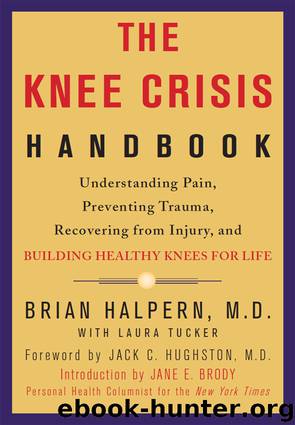THE KNEE CRISIS HANDBOOK by Brian Halpern & Laura Tucker

Author:Brian Halpern & Laura Tucker
Language: eng
Format: epub
Publisher: Rodale Inc.
Published: 2003-03-15T00:00:00+00:00
EXERCISE
Move— even if you don't want to. It's the easiest thing in the world to let arthritis dictate what you will and won't do. But it's essential that you keep moving, for a number of reasons.
First of all, stretching and exercise designed to increase your range of motion will help with the pain you experience as a result of osteoarthritis. The first issue on the agenda is to work on flexibility across the knee joint. When we're in pain, we have a tendency to “splint” ourselves—we instinctively immobilize the joint ourselves in order to protect it. While this does protect us from pain in the short-term, it causes tightness and contraction—and more pain—over the long haul. Increasing flexibility and range of motion is ultimately very beneficial. Gaining strength in the muscles that support the knee will also help to relieve some of the pain you feel as you remove some of the stress across the joint. It will also help to keep the joint healthy.
The benefits of exercise don't stop there. It's not news that we experience pain subjectively. We're all familiar with the stories of football players who are so caught up in the competitive spirit that they don't realize they're playing with a fracture, for instance. There's a lot of evidence that arthritis patients who exercise experience less pain and depression as a result of their condition than those who don't.
This may have something to do with the natural endorphins that are released when we exercise. The increased range of motion and strength that exercise buys arthritis sufferers also allows them to continue with their activities of daily living, which is a good feeling in itself—you feel better because you can do more. When you're actively participating in your care, you have an increased sense of control: the feeling that you're on top of the disease, as opposed to being a victim of it.
The answer might be a combination of all of the above—or none of them—but I notice an enormous and positive increase in the psychological well-being and physical state of my arthritis patients who exercise regularly.
That said, it's important to remind you of the essential balance between exercise and rest. If you're tired, or if your joint is tired and especially swollen or irritated, listen to your body and take a break. I'm still not recommending complete immobility—there's nothing wrong with a few gentle range-of-motion exercises as long as they're not causing you pain—but you can save the harder stuff for a day when you feel better. Again, please don't “push through the pain.” While I can't promise that you won't feel a twinge or two, when exercise is seriously painful, it's a message from your body that you're causing additional damage.
Download
This site does not store any files on its server. We only index and link to content provided by other sites. Please contact the content providers to delete copyright contents if any and email us, we'll remove relevant links or contents immediately.
Periodization Training for Sports by Tudor Bompa(8236)
Why We Sleep: Unlocking the Power of Sleep and Dreams by Matthew Walker(6681)
Paper Towns by Green John(5162)
The Immortal Life of Henrietta Lacks by Rebecca Skloot(4564)
The Sports Rules Book by Human Kinetics(4367)
Dynamic Alignment Through Imagery by Eric Franklin(4199)
ACSM's Complete Guide to Fitness & Health by ACSM(4040)
Kaplan MCAT Organic Chemistry Review: Created for MCAT 2015 (Kaplan Test Prep) by Kaplan(3992)
Introduction to Kinesiology by Shirl J. Hoffman(3753)
Livewired by David Eagleman(3752)
The Death of the Heart by Elizabeth Bowen(3596)
The River of Consciousness by Oliver Sacks(3586)
Alchemy and Alchemists by C. J. S. Thompson(3501)
Bad Pharma by Ben Goldacre(3411)
Descartes' Error by Antonio Damasio(3261)
The Emperor of All Maladies: A Biography of Cancer by Siddhartha Mukherjee(3131)
The Gene: An Intimate History by Siddhartha Mukherjee(3085)
The Fate of Rome: Climate, Disease, and the End of an Empire (The Princeton History of the Ancient World) by Kyle Harper(3045)
Kaplan MCAT Behavioral Sciences Review: Created for MCAT 2015 (Kaplan Test Prep) by Kaplan(2972)
